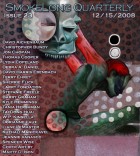The editors here were captivated by the rhythm in your lovely story, Lydia. The way it sounds like a train, chugging words and phrases into poetry that becomes the piece. How did that “pace” and this story find each other? Are you conscious of rhythm as you write?
Actually, I never noticed the chugging rhythm to this story until you pointed it out. I wrote this story just after beginning a new job, which required an hour commute to and from Manhattan, and I remember being fresh off the train that day and feeling a little discombobulated still when I sat down to write. I’m sure I wasn’t consciously aware of the rhythm this story took on as I wrote it, and since I’ve been accused of having a very sing-song voice, I think my stories probably always have a sort of rhythm to them, whether I mean them to or not. Honestly, I’m never conscious of rhythm as I write, but when editing I usually pick-up on a story’s rhythm and weed out the words that seem jarring or out of place.
Somehow you both set the scene and give us a glimpse into the main character’s world view in the first sentence! There has been much talk about the importance of the opening line in short fiction. Can you tell us anything about how a great first line evolves?
Great first lines almost always come to me out of nowhere, from something I’ve read or seen or felt, and usually lines will pop into my head while I’m at work or driving, some place completely inconvenient. I work at a library cataloging vast amounts of course materials all day. Titles and sentences catch my eye all day and usually spur an idea for a story or a first line. Last week I worked on a course about horror films and catalogued articles with titles like Bodies that Splatter. Lately I’ve been coming up with first lines and ideas for stories just by lingering over an article before I catalog it. I have post-it notes stuck all over my laptop, cellphone, anything carried to work with me that day, with bits and pieces of would-be first lines. I guess writers do this with everything. It probably wouldn’t matter what my job was.
This piece feels deeply emotional and visual—a quality I’ve noticed in much of your work. The colors, textures, tastes, sounds—all are vivid and put us right into the life of the speaker. Any suggestions for other writers on drawing from “what you know?”
I used to fill marbled composition books full of notes, used to keep one with me all the time and wrote in it everyday. I have boxes and boxes of these things. These were great notebooks because it took a few weeks to fill one up and they’re very inexpensive. Unfortunately, I’ve gotten out of the habit of keeping a daily notebook and recording ideas and descriptions. This is something I should resign myself to doing again. Maybe this will be my New Year’s resolution. However, I do usually keep a little notepad or scrap of paper with me at all times. And I always have pens on me. You never know when an idea will come to you. A couple of years ago for Valentine’s Day, my husband gave me a few of those black, flip-top books that police detectives use. These make perfect notebooks. They’re small and portable and you look cool using one.
As for drawing on what you know…Whether you mean for it to or not, what you know, your unique experience, will come out on the page. What you know seems inescapable to me. Sometimes I try to write about what I don’t know and that’s fun, but it’s always infused with something I’ve experienced. For instance, I just wrote a story about a teacher having an affair with a student’s parent. This is not something I’ve ever experienced, but the story is set in a biology classroom, which is taken directly from my memories of spending summers in the biology department of the university where my father taught. When I wrote this story all these images of animal specimens and dissecting trays came back to me and ended up in my story.
Which are the books that made the deepest impression on you during you formative years? Can you recommend for us some recent favorites: stories, books, literary magazines, authors, etc.
I read lots of Bukowski and rock star biographies during my formative years. I also spent a great deal of time with the Vintage Book of American Poetry, which my uncle gave me for Christmas when he found out I was writing poems. It wasn’t until I first encountered Raymond Carver in a creative writing course in college that I decided I wanted to write fiction. Carver is probably my favorite writer.
Lately, I’ve been re-reading Ann Beattie. I absolutely love her! I’ve also just finished Rebecca Curtis’s Twenty Grand which I thought was fabulous. And, although I no longer write poetry, I read it just as much as I read fiction. If I have writer’s block I usually reach for a book of poems and read for a few minutes. Somehow poetry gets me revved up and ready to write. Frank Stanford is a recent favorite of mine. His poems are very narrative and rich. Right now I’m in the middle of Rachel Sherman’s The First Hurt, which gives me something to look forward to on the train ride home. As for literary magazines, aside from online journals like SLQ, elimae, Juked which I read daily, I love the Georgia Review. I used to subscribe, but now I’m poor, so it’s a treat when I can grab a copy.
There is great efficiency in your writing. Each word is filled with meaning and urgency. Talk about the importance of “compression” in flash.
With flash, the writer has to pin the story down pretty quickly and in the smallest of spaces. When writing this way, every word counts. It’s exciting and the writing itself is usually pretty quick. With longer, more traditional stories, a writer can get away with more, but with flash even the smallest misstep shows. Probably because I don’t really know what I’m doing, I edit and edit my flash pieces and take out all the boring sentences, all the breathing spaces, and what I’m left with is usually quick, intense and, like you said, urgent. In my flash stories, I want each word to have a purpose. In this particular story, I really wrote what I knew. I had just moved from Tennessee to New Jersey, and my family was still settling into a routine. I was having a bad day and felt like I had been on a train for most of the week. I was still getting used to my new work schedule, and I missed my little boy and my husband and was terribly homesick for Tennessee. When I sat down to write that day all those things came out as I typed. In this case, the sense of urgency most likely had more to do with my mental state that day than with the tight quarters of flash fiction, although I know that helped as well.



 The core workshop of SmokeLong Fitness is all in writing, so you can take part from anywhere at anytime. We are excited about creating a supportive, consistent and structured environment for flash writers to work on their craft in a community. We are thrilled and proud to say that our workshop participants have won, placed, or been listed in every major flash competition. Community works.
The core workshop of SmokeLong Fitness is all in writing, so you can take part from anywhere at anytime. We are excited about creating a supportive, consistent and structured environment for flash writers to work on their craft in a community. We are thrilled and proud to say that our workshop participants have won, placed, or been listed in every major flash competition. Community works.